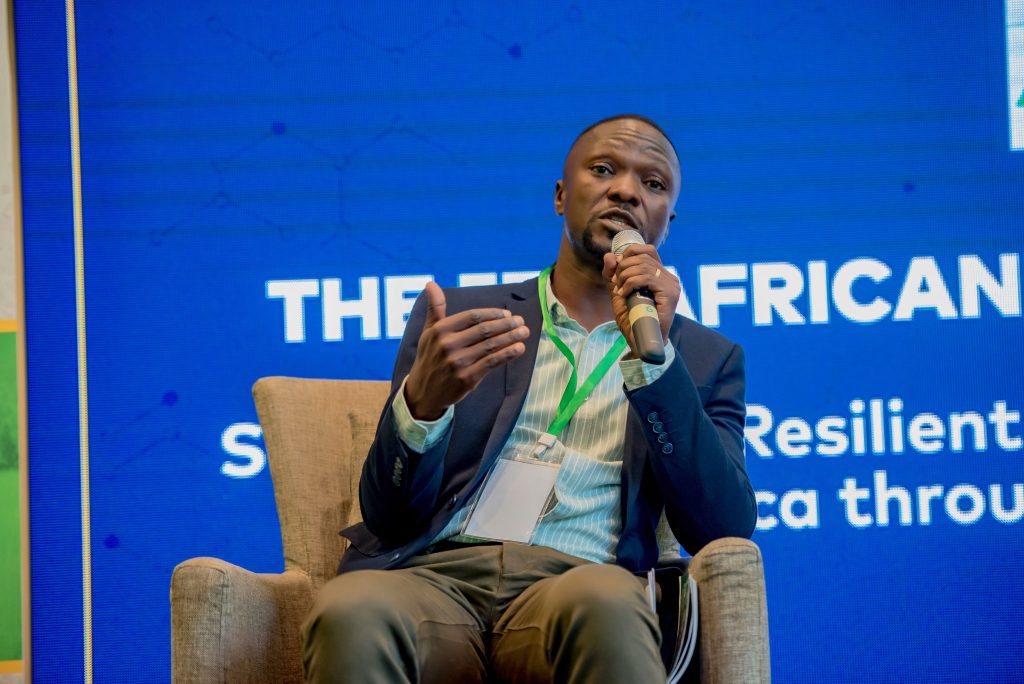NOGAMU’s Namuwoza tapped to lead bid for increased intra-African trade in organics
 Chariton Namuwoza speaking during the 5th African Organic Conference in Kigali
Chariton Namuwoza speaking during the 5th African Organic Conference in Kigali
Uganda is set to lead efforts for higher trade in organic products among African countries and the drive for alternative certification systems for smallholder farmers engaged in sustainable agriculture. This is after Chariton Namuwoza, the Chief Executive Officer of the National Organic Agricultural Movement of Uganda (NOGAMU), was elected President of the African Organic Network (AfrONet), a continental body which unites actors in the organic industry in Africa.
Namuwoza was elected at the close of the 5th African Organic Conference and General Assembly, that ran in Kigali Rwanda, from December12th – 15th 2023.
Among others, the assembly resolved to increase the volume of continental trade in organic products produced within Africa, by riding on the wave of trade liberalization and consumer awareness within the continent; and promoting alternative certification schemes, to increase volumes of certified organic output by African smallholder organic farmers.
According to Namuwoza, who will lead AfrOnet until 2027, such initiatives will not only make African organic farming more resilient, but also insulate producers against shocks, by reducing their overdependence on fickle international markets.
“We realised that there is great potential for trade in organic trade within Africa but this needs to be supported with strengthened policy and regulatory frameworks as well as certification schemes such as the Participatory Guarantee System (PGS),” Namuwoza says.
“PGS is more suited to the African landscape of smallholder producers who are organic by default but find conventional certification schemes too costly,” he adds.
This is crucial because while one finds an increasing presence of organic products on the shelves in African retail stores, the bulk are imported. This is emblematic of growing consciousness and preference for organic products by farmers, as well as the barriers such as certification, which limit the participation of African producers in the marketplace.
PGS is a simple and cost-effective certification mechanism under which stakeholders like farmers, agricultural extension workers producers, local leaders and consumers, come together to verify farm practices by producer and based on their assessment either deny or issue certification.
“That is a much simpler, easier and less costly scheme and it is recognised globally. It would be much cheaper for our farmers that we have known for a long time to be organic by default. We think the time is ripe for us to push certification along that route,” Namuwoza argues.
Achieving that goal however, requires a degree of re-alignment of several aspects of the value chain, including linking research to production and recasting training at tertiary level, which is currently biased towards conventional agriculture.
“As a result, you find that the extension services are not aware of the shift towards organics and sustainable food systems.”
AfrOnet is angling for improved regulatory frameworks to streamline organic production and increased resource allocation to support research, production and access to appropriate technology by smallholder farmers and processors across the organic agriculture value-chain.
In Uganda, which has the largest number of certified organic farmers in Africa and the second globally, NOGAMU is pushing for the enactment of an Organic Agriculture law, to make the existing organic farming policy and regulatory framework enforceable.

 African Heads of state head to South Korea next week for Summit talks
African Heads of state head to South Korea next week for Summit talks
 Trading leads as main source of income for Ugandans
Trading leads as main source of income for Ugandans
 New leadership for bankers’ umbrella as total assets top $12 billion
New leadership for bankers’ umbrella as total assets top $12 billion
 Brussels Airlines to announce Nairobi service
Brussels Airlines to announce Nairobi service
 SITA promises enhanced travel experience after Materna acquisition
SITA promises enhanced travel experience after Materna acquisition
 Saudia’s 105 aircraft order stretches A320neo lead over rival Max
Saudia’s 105 aircraft order stretches A320neo lead over rival Max
